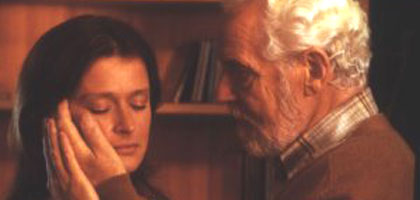
Lies and whispers
Film of the Month: Faithless

Liv Ullmann's Bergman-scripted Faithless shows sex as power and pain. By Philip Strick
The enigma that is Faithless has been created by at least seven story-tellers, none of whom can be trusted. At its simplest, the film consists of the fantasies of an ageing writer who constructs - perhaps from his remembered past - a quartet of recalcitrant fictions: three adults, one child, and their involvement in a series of misdemeanours, in particular an extra-marital affair. Although of central concern, the child can be presumed an innocent bystander, already garrulous with her own stories but also anxious to learn from example. This scenario offers a painful if open-ended meditation on the pleasures and perils of infidelity and its impact on the next generation. If this were all, the single and singularly unhelpful lesson Faithless appears to offer would be that parents can only be relied on to indulge in strange behaviour which we seldom survive unscathed.
The director, however, has other claims. "I don't really believe," says Liv Ullmann, "that a film should have a message", but to avoid the risk of reducing Faithless to a collection of inconsequential anecdotes, she grants that an observer's response is likely to be: "I will treat people around me more carefully." Less tritely, she also suggests that "the light in the story is that we can forget the hours that were full of suffering" - yet the film's characters are laden with painful memories which show little sign of fading away. On the contrary, a more persuasive theme might be that past errors are recycled, with fresh suffering as a result. Faithlessness, in short, is more pain than gain.
From a child's point of view, the peculiar compulsion that drives adults to disregard this truism must seem incomprehensible. The void at the centre of Faithless is caused by the hardly avoidable discretion with which sexuality is portrayed, or rather overlooked until the shock of explicit description when the wife tells of her husband's attack (he rapes her when she agrees to meet him to discuss the custody of their child). Earlier the illicit couple squirm beneath the overhead camera like specimens on a slide, frantic to cover themselves from our gaze or perhaps from that of a higher authority. Erotic tension, which should provide the pulse for their affair, is instead implied by a banality of suffocating red drapes, a silk nightgown and some sinuous bedsteads. Sex itself, instead of being its own reward, becomes symbolic - of complicity, habit, power, control and punishment.
As a result, the rationale behind the film's assorted betrayals appears less physical than hedonistic, a desire for what Marianne, the devoted wife, describes as "fun". Why she should suddenly propose such diversion to David, the platonic friend of all the family, is a mystery as much to her as to the rest of us, and grows no clearer from what we learn of her secure marriage to composer Markus and attentive motherhood. (David's initial proposal to her, on the other hand, is recognisably in keeping with an amiable lack of principle.) "Can't we just see how it goes?" she lightly asks her agitated lover, who after their first romantic adventure wants total possession. And she later declares with some amusement, before the repercussions begin, that having two men in her life is easier than she expected. Both in risk-taking temerity and in vulnerability she shares characteristics with the heroines of Ullmann's other films, ensnared in a muddle of longings like the sufferers in Sophie (1992), Kristin Lavranssdatter (1995), Private Confessions (1997) and the yet-to-be-filmed Anne Frank project. But her vocabulary, as in Private Confessions, originates elsewhere - with Ingmar Bergman.
Scripted by Bergman, who even lends his name to the reclusive author portrayed by his frequent on-screen alter ego Erland Josephson, Faithless offers itself, with appealing guile, as authentic autobiography. The first signs are that it reconstructs the summer of 1949, when the volatile genius, two families already in collapse behind him, turned 31 and gatecrashed another marriage by way of a Parisian interlude, seemingly with few pangs of conscience. His new partner's husband furiously attempted to win her back, finally resorting to rape. Afflicted (as he tells it in his memoir The Magic Lantern) by retrospective jealousy, Bergman gave the girl not the slightest sympathy, later married her, and in due course ran off with Harriet Andersson. Over the years a gradual penitence overtook his disregard for conventional restraint, charted in his films by a succession of anguished couples who, like the wretched Almans in Wild Strawberries (1957), subject each other to endless humiliation.
Bergman couldn't forgive himself, according to Ullmann, for the "rape and rage" episode, yet to interpret Faithless as exorcism would seem mistaken. "Much of it," she says of his script, "did not happen, that I am sure of", while in his Magic Lantern description of the crucial scene Bergman himself admits, "I have never found out what really happened." On screen, Marianne's description of her ordeal is luridly detailed, enough to raise questions about the level of her compliance but also aligning her with the many confessors in Bergman's work (the nurse in Persona, 1966, for instance) who reveal dark secrets direct to camera. If, by simple omission (other than the occasional church bell) Faithless reflects on the melancholy condition of a literally faith-less society - despite Bergman's claim to be no longer concerned with such matters - the ritual penance of the confessional is scrupulously observed by all the film's characters.
 |
| Faithless |
In an unexpected reversal, the screen Bergman asserts at one point that he never met Marianne's husband Markus, whose manipulative influence turns out to have infected their collective behaviour for so long he almost has best claim to being the author of the piece. Since we've been given every reason to suppose that 'Bergman' and David are one, and we know David has been a family friend for years, this denial is either mischievous or mistaken, either a fanciful confirmation that the characters are primarily fictions dreamed up by 'Bergman' (we only properly hear Markus' voice by letter, after all), or an absent-minded throwback to the realities of 1949. Or it could simply be that remembered fact (the visit to Paris) is in the course of the drama overtaken by the demands of fantasy. In the film Marianne has an abortion; in fact, their child grew up to be Ingmar Junior who (according to The Magic Lantern) loathed his father. Which 'truth' is the more painfulf?
Marianne's luckless daughter Isabelle, to whom Ullmann claims to have devoted more attention than Bergman when she revised his screenplay, similarly has no place in The Magic Lantern (the custody battle was fought over two small sons). Even so, her forerunners are to be found everywhere else in Bergman's work, from the entranced redhead who punctuates The Magic Flute (1975) to the wandering youth in The Silence (1963), the raptly attentive schoolboy at the end of To Joy (1949, a preface to Faithless just as Scenes from a Marriage, 1973, is its clearest rehearsal), and, of course, Fanny and Alexander (1982). The collision between generations is as much a part of Bergman's iconography as rowing boats, music boxes, the proscenium arch and the Fårö shoreline. Knowing them well, Ullmann fits them all into her film.
It looks just as Bergman might have filmed it: formal, precise and demanding of its cast an astonishing surrender to a gallery of unflinching close-ups. Nothing in the camerawork is overstated, although every lighting change (gold to blue at the flick of a switch, ominous shadows when a window blind is lowered) is of calculated significance. When the camera moves, it's with reluctance (in keeping with the mature Bergman's dislike of tracking shots) but with exemplary relevance, as in the prowl around an apartment that ends up in the bedroom or the sudden retreat into the air above the writer as he recognises the full horror of what he's done.
If Ullmann has unquestionably appropriated from her years with Bergman (and Josephson) a magnificent empathy with her players, she is also rewardingly attentive to visual detail. Note, for instance, the framing of the hospital sequence, the deployment of sculptures in the lawyer's office, or the timing of the 'discovery' as the lovers giggle helplessly in embarrassment and desperation. By design, the final Mozart theme plays to a halt during the end credits, not two shots earlier while the writer wanders towards the sea. It is the project, with all its ambiguities, that has been put to rest, not the troubled spirit that conceived it.
